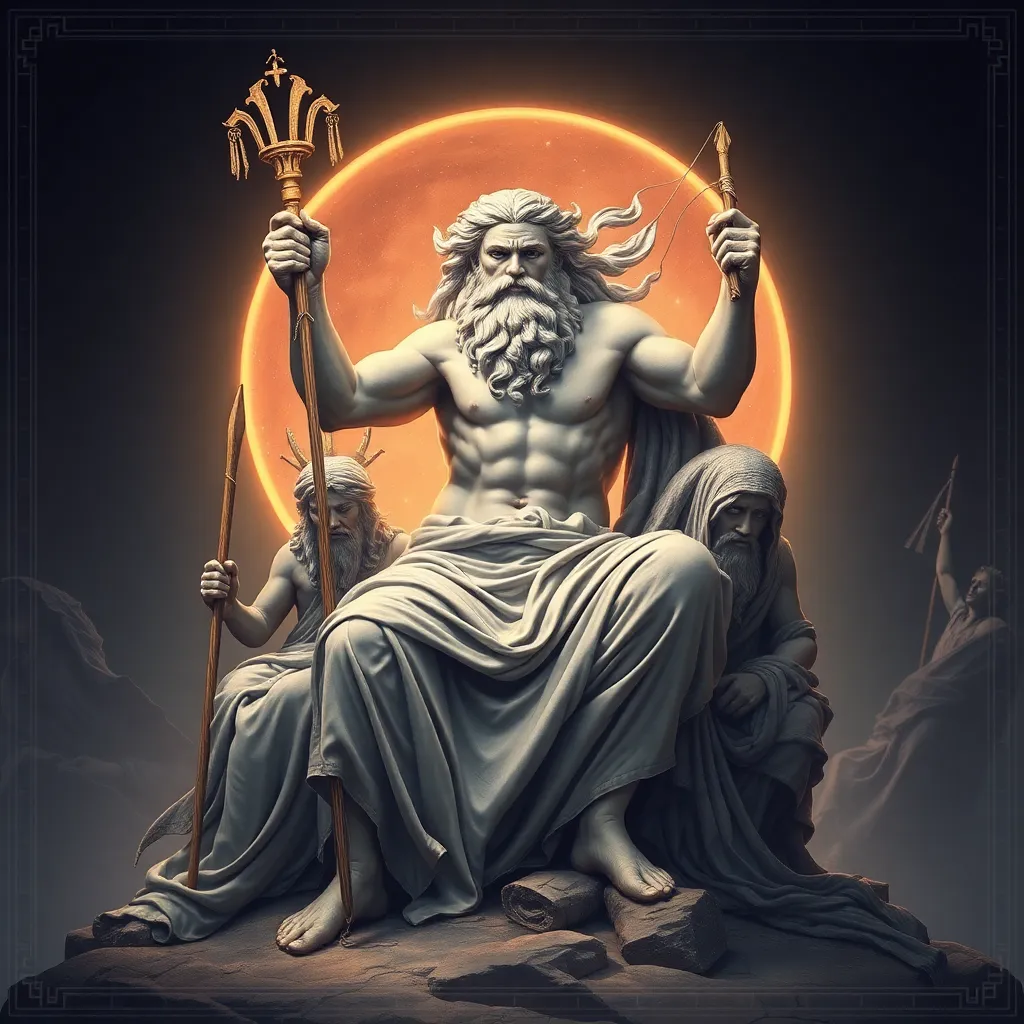The Myths of Zeus and the Fates: Weaving the Threads of Destiny
I. Introduction
Greek mythology is a rich tapestry of stories, characters, and themes that have shaped Western literature and thought for centuries. It serves as a window into ancient Greek culture, revealing their beliefs about the gods, humanity, and the cosmos. Central to this mythological framework are powerful deities, among which Zeus, the king of the gods, and the Fates, who govern destiny, stand out.
This article aims to unravel the complex myths surrounding these entities, exploring how their stories intertwine and what they reveal about the nature of power, fate, and free will in Greek thought.
II. The Role of Zeus in Greek Mythology
Zeus, often depicted as a regal figure wielding a lightning bolt, is the chief deity in the Greek pantheon. He embodies authority, justice, and the enforcement of order among both gods and mortals.
A. Overview of Zeus as the king of the gods
As the ruler of Mount Olympus, Zeus presides over the other gods, ensuring that they fulfill their roles and maintain harmony in the world. His decisions shape the fate of both divine and mortal beings.
B. His attributes and symbols
- Lightning Bolt: Symbolizes his power and ability to enforce justice.
- Eagle: Represents sovereignty and is often seen as his messenger.
- Oak Tree: Sacred to Zeus, symbolizing strength and endurance.
C. Key myths featuring Zeus: power, justice, and sovereignty
Several myths illustrate Zeus’s role as a powerful ruler:
- The Titanomachy: Zeus led the Olympian gods in a war against the Titans, asserting his dominance.
- The Judgment of Paris: Zeus played a critical role in the events leading to the Trojan War.
- Lycaon’s Punishment: Zeus demonstrated his authority by transforming Lycaon into a wolf for challenging his divinity.
III. Understanding the Fates: Clotho, Lachesis, and Atropos
The Fates, known as the Moirai, consist of three sisters: Clotho, Lachesis, and Atropos. They are revered as the weavers of destiny, controlling the life span and fate of every individual.
A. Introduction to the Fates and their origin
According to myth, the Fates were born from primordial entities, symbolizing the inevitable nature of fate and the universe’s order.
B. Description of each Fate’s role in weaving destiny
- Clotho: The spinner, who spins the thread of life.
- Lachesis: The allotter, who measures the thread and determines the length of life.
- Atropos: The inevitable, who cuts the thread, signifying death.
C. The significance of their triad in Greek mythology
Their triad represents the inescapable fate that governs all beings, highlighting the interplay between destiny and free will.
IV. Interactions Between Zeus and the Fates
The relationship between Zeus and the Fates is complex and often depicted in myths that explore the balance of power.
A. Historical myths depicting their relationship
In many stories, Zeus is portrayed as respecting the Fates, acknowledging that even he cannot alter the threads they weave.
B. The balance of power: Zeus’s authority vs. the Fates’ control over destiny
This dynamic raises profound questions about divine authority and the limits of power:
- Does Zeus have the ability to change fate?
- Are the Fates completely independent of Zeus’s will?
C. Interpretations of their interactions in ancient texts
Interpretations of their relationship vary, with some texts emphasizing Zeus’s respect for the Fates, while others suggest moments of tension between divine authority and the inevitability of fate.
V. Common Myths and Misconceptions
Despite their prominence in mythology, misconceptions about Zeus and the Fates abound.
A. Debunking myths about Zeus’s omnipotence
While Zeus is a powerful god, he is not all-powerful. His authority is limited by the Fates, illustrating that even gods are subject to higher laws.
B. Clarifying misconceptions about the Fates’ influence on free will
The Fates do not negate free will; rather, they operate within a framework that allows for personal choices while still adhering to a predetermined order.
C. How these myths have evolved over time
These myths have been reinterpreted through various cultural lenses, adapting to contemporary discussions about fate and autonomy.
VI. Symbolism of Weaving in Mythology
The act of weaving is a powerful metaphor in mythology, representing the intricate nature of life and destiny.
A. The metaphor of weaving as a representation of fate
Weaving signifies how lives are interconnected, with each thread representing a different life path.
B. The significance of threads in mythology and storytelling
- Threads symbolize the choices individuals make.
- The weaving process mirrors life’s complexity.
C. The connection between weaving, fate, and human experience
Just as the Fates weave the threads of life, humans continuously weave their narratives through choices, relationships, and experiences.
VII. Modern Interpretations and Cultural Impact
The legacy of Zeus and the Fates extends into contemporary culture, influencing literature, art, and philosophy.
A. The legacy of Zeus and the Fates in contemporary literature and art
These figures continue to inspire modern works, often serving as symbols of power and the human condition.
B. How modern culture reinterprets these myths
Current narratives often explore themes of autonomy versus predestination, reflecting society’s ongoing struggle with these concepts.
C. The relevance of their stories in today’s discussions of fate and free will
In a world where questions of destiny and free will are increasingly pertinent, the stories of Zeus and the Fates provide a rich backdrop for exploration and reflection.
VIII. Conclusion
In conclusion, the myths of Zeus and the Fates offer profound insights into the nature of power, destiny, and human experience. Their complex interactions illustrate the delicate balance between divine authority and the threads of fate that govern all beings.
As we reflect on these ancient narratives, we recognize their enduring power and relevance in understanding our own lives. The relationship between divine authority and human destiny remains a timeless theme, inviting us to ponder our own paths within the intricate tapestry of existence.




